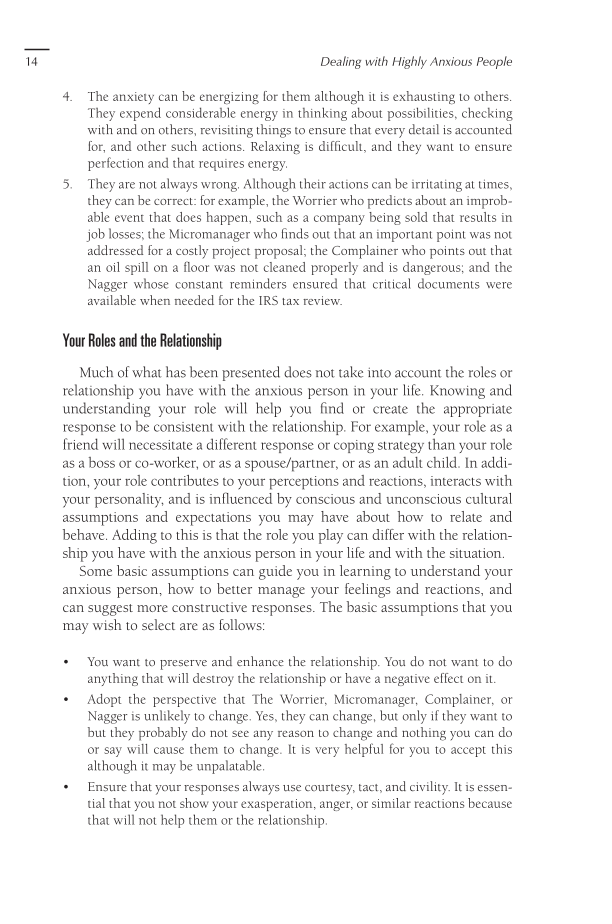14 Dealing with Highly Anxious People 4. The anxiety can be energizing for them although it is exhausting to others. They expend considerable energy in thinking about possibilities, checking with and on others, revisiting things to ensure that every detail is accounted for, and other such actions. Relaxing is difficult, and they want to ensure perfection and that requires energy. 5. They are not always wrong. Although their actions can be irritating at times, they can be correct: for example, the Worrier who predicts about an improb- able event that does happen, such as a company being sold that results in job losses the Micromanager who finds out that an important point was not addressed for a costly project proposal the Complainer who points out that an oil spill on a floor was not cleaned properly and is dangerous and the Nagger whose constant reminders ensured that critical documents were available when needed for the IRS tax review. Your Roles and the Relationship Much of what has been presented does not take into account the roles or relationship you have with the anxious person in your life. Knowing and understanding your role will help you find or create the appropriate response to be consistent with the relationship. For example, your role as a friend will necessitate a different response or coping strategy than your role as a boss or co-worker, or as a spouse/partner, or as an adult child. In addi- tion, your role contributes to your perceptions and reactions, interacts with your personality, and is influenced by conscious and unconscious cultural assumptions and expectations you may have about how to relate and behave. Adding to this is that the role you play can differ with the relation- ship you have with the anxious person in your life and with the situation. Some basic assumptions can guide you in learning to understand your anxious person, how to better manage your feelings and reactions, and can suggest more constructive responses. The basic assumptions that you may wish to select are as follows: • You want to preserve and enhance the relationship. You do not want to do anything that will destroy the relationship or have a negative effect on it. • Adopt the perspective that The Worrier, Micromanager, Complainer, or Nagger is unlikely to change. Yes, they can change, but only if they want to but they probably do not see any reason to change and nothing you can do or say will cause them to change. It is very helpful for you to accept this although it may be unpalatable. • Ensure that your responses always use courtesy, tact, and civility. It is essen- tial that you not show your exasperation, anger, or similar reactions because that will not help them or the relationship.
Document Details My Account Print multiple pages
Print
You have printed 0 times in the last 24 hours.
Your print count will reset on at .
You may print 0 more time(s) before then.
You may print a maximum of 0 pages at a time.














































































































































































































